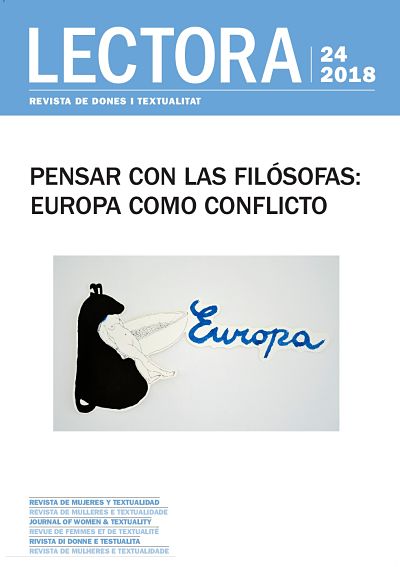Women's Writing in the Sixties: Discomforts, Fears, and Oddish Readings in "El escarabajo de oro"
DOI:
https://doi.org/10.1344/Lectora2018.24.10Keywords:
feminism, women's writing, El escarabajo de oro, Liliana HekerAbstract
This article analyses the ideas that emerge from the term "women's writing" that circulates in cultural magazines in the sixties in Argentina. More specifically, it analyses Liliana Heker's texts published in El escarabajo de oro. It then asks what ideas about sexual difference can be read and what aesthetic and ideological disputes are at play in questioning this notion. The analysis is based on the hypothesis that conservative ideas predominate with respect to sexual difference, although some fissures are glimpsed. The article also focuses on the discomfort that this question generates, the foundations that are used, how Virginia Woolf and Simone de Beauvoir are read, the prejudices against feminism and, finally, it proposes the figure of Silvina Bullrich as the counterexample of the woman writer of the time.
References
Battista, Vicente (1964), "Los reportajes que nadie se explica. Tomando mate con Beatriz Guido", El escarabajo de oro, 23-24: 12-14.
Beauvoir, Simone de (1987), El segundo sexo. La experiencia vivida, Pablo Palant (trad.), Buenos Aires, Siglo XXI Editores. [1949]
Blanco, Mariela (2006), "Cortázar-Viñas: Afirmación y negación de una
polémica", Texturas, 6: 27-36. <https://bit.ly/2KzN4At>
Calabrese, Elisa (2005), "Las revistas de Abelardo Castillo. Un proyecto cultural
alternativo", CELEHIS. Revista del centro de letras hispanoamericanas, 14-15
(17): 39-57.
—(2006), Animales fabulosos. Las revistas de Abelardo Castillo, Mar del Plata,
Editorial Martín.
Casarín, Marcelo (2010), "Ensayos de escritores: Mercado, Heker, Piglia, Saer",
Astrolabio, 2: 165-170.
Castillo, Abelardo (1959), "El marica", El grillo de papel, 1 (1): 1.
Diz, Tania (2012), "Del elogio a la injuria: La escritora como mito en el imaginario cultural de los 20 y 30", La biblioteca. Mitológicas, 12: 310-331.
Domínguez, Nora (2010), "Gradaciones: Muy leídas, poco leídas, nada leídas",
Boletín del Centro de Estudios de Teoría y Crítica Literaria, 15: 1-21.
Femenías, María Luisa (2012), Sobre sujeto y género. (Re) Lecturas feministas desde Beauvoir a Butler, Rosario, Prohistoria ediciones.
Ferrero, Adrián (2007), "Exilio poético y exilio político: La polémica entre Liliana
Heker y Julio Cortázar en la revista cultural El ornitorrinco", Questión, 16: 442-
366.
Frouman-Smith, Erica (1979), "Entrevista con Silvina Bullrich", Chasqui: Revista
de literatura latinoamericana, 8 (2): 37-46.
Grande Cobián, Leonardo (2006), "¿Un bicho raro? El programa político de El
grillo de papel y El escarabajo de oro, 1959-1964", Razón y revolución, 15: 11-
29.
González, Patricia Elena y Eliana Ortega (eds.) (1984), La sartén por el mango.
Encuentro de escritoras latinoamericanas, Puerto Rico, Huracán.
Guido, Beatriz (1960), "Una hermosa familia", El grillo de papel, 2 (4): 1.
Heker, Liliana (1967a), "Las hermanas de Shakespeare. Sobre las mujeres y la
literatura" (primera parte), El escarabajo de oro, 8 (34): 10-12, 14.
—(1967b), "Las hermanas de Shakespeare. Sobre las mujeres y la literatura"
(segunda parte), El escarabajo de oro, 8 (35): 15, 18.
—(1999), Las hermanas de Shakespeare, Buenos Aires, Alfaguara.
Maristany, José (2008), "Entre Arlt y Puig, el affaire Correas", Orbis tertius, 13: 1-14.
Moreno, María (2005), "Silvina Bullrich. 'Si no soy Proust, paciencia'", Vida de
vivos. Conversaciones incidentales y retratos sin retocar, Buenos Aires,
Sudamericana: 29-42.
Nari, Marcela (2002), "No se nace feminista, se llega a serlo. Lecturas y recuerdos de Simone de Beauvoir en Argentina, 1959-1990", Mora. Revista del Instituto Interdisciplinario de Estudios de Género, 8: 59-72.
Rama, Ángel (1966), "Mujeres, dijo el penado alto", Marcha, 1290: 30-31.
Rojas, Ricardo (1960), Historia de la literatura argentina. Ensayo filosófico sobre la evolución de la cultura en el Plata, Buenos Aires, Kraft.
Sábato, Ernesto (1953), Heterodoxia, Buenos Aires, Emecé.
Saítta, Sylvia (2015), "El grillo canta en continuado", Revista Ñ, 01/07/18.
<https://clar.in/2J9GpIk>
Vázquez Santamaría, Jorge (1965), "Cazando grillos con Liliana Heker", El
escarabajo de oro, 5 (28): 21-22.
Woolf, Virginia (1935), "Un cuarto propio", Sur, V (15): 7-29.
Zangrandi, Marcos (2015), "Polémica en tres tiempos. Debates alrededor de la saga nacional de Beatriz Guido", Literatura y lingüística, 33: 197-216.
Downloads
Published
How to Cite
Issue
Section
License
The Author retains ownership of the copyright in this article and grants Lectora: revista de dones i textualitat the rights to print publication of the Article. The work will be available under a Creative Commons Attribution-Noncommercial-No Derivative Works license, by which the article must be credited to the Author and the Journal be credited as first place of publication.
The Author is free to enter in seperate, additional contractual agreements for the non-exclusive distribution of the work as published in this journal (such as institutional repositories or a book), as long as the original publication in Lectora is credited.
The Author is encouraged to post the work online (eg in institutional or thematic repositories, or in their website), as it can lead to productive exchanges as well as to a greater citation of the published work (see The Effect of Open Access).




